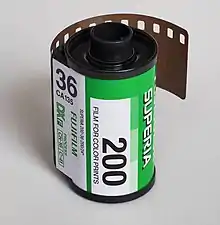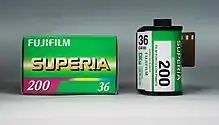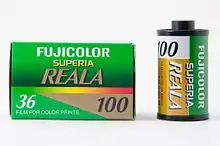Fujifilm Superia
Fujicolor Superia is a Fujifilm brand of daylight balanced colour negative film introduced ca.1998 primarily aimed at the consumer market, but was also sold in a professional 'press' variant. A key feature at launch was the '4th' cyan colour layer designed to provide improved colour reproduction under fluorescent lighting. Its Kodak equivalent is the Kodacolor (later Kodak) Gold/Ultramax line.
| Superia | |
|---|---|
 | |
| Maker | Fujifilm |
| Speed | 100/21°, 200/24°, 400/27°, 800/30°, 1600/33° |
| Type | Color print |
| Balance | Daylight |
| Process | C-41 |
| Format | 35mm, 120/220, 110 |
| Application | General (consumer) |
| Superia 200[1] | |
|---|---|
 | |
| Speed | 200/24° |
| Type | Color print |
| Process | C-41 |
| Format | 35mm |
| Application | General (enthusiast) |
| Superia Reala[2] | |
|---|---|
 | |
| Speed | 100/21° |
| Type | Color print |
| Process | C-41 |
| Format | 35mm, 120/220 |
| Application | General (enthusiast) |
By mid 2019 the Superia product line had been consolidated into two films; Superia X-tra 400 (distributed outside Japan) and Superia Premium 400 (officially distributed in Japan only).
History
Fujicolor Superia is a Fujifilm brand of daylight balanced consumer colour negative film introduced c1998 replacing the previous 'Super G plus' films. This film has been manufactured in 100, 200, 400, 800 and 1600 ISO speeds.[2][1][3][4][5] Superia Premium 400 a Japanese market variant was added in 2009. The Superia line was a primarily aimed at the consumer point and shoot market but is also popular with enthusiasts. All speeds of all films were available in 135 format. Superia 100 and 400, as well as Reala 100 were additionally available in the 120 format. Superia 200 was also made in the 110 format. Despite the launch of Superia, Fujifilm also continued to offer a budget 'fujicolour' negative film in ISO 100 or 200 speeds based on older technology for price sensitive markets.
With the heavy decline of both the amateur enthusiast and 'point and shoot' markets for consumer colour film at the very end of the first decade of the 2000s due to the substitution of compact film cameras with digital cameras (and subsequently camera phones) [6] the range has been steadily rationalised with films discontinued; Superia 100 (2009?), Reala 100 (2012), Superia X-tra 800 & Superia 1600 (outside Japan - 2016). Superia 200 (2017) and Natura 1600 (Japan - 2017). Additionally the range of packaging options for the remaining films was reduced. In January 2019 Superia X-tra 400 was removed from sale in the Japan market. In May 2019 Fujifilm announced the discontinuation of Venus 800 in Japan effective December 2019.[7] 3-roll packs of Superia Premium in Japan were axed in March 2020.
By mid 2019 the product line had been consolidated into two Superia films, both ISO 400 'all conditions' films in 135 format only; Superia X-tra 400 (distributed outside Japan) and Superia Premium 400 (officially distributed in Japan).
Film Layers
All current films in the Superia range list the following layer composition in their product information.

| Press | |
|---|---|
| Speed | 400/27°, 800/30° |
| Type | Color |
| Format | 35mm |
| Application | General (professional) |
The '4th' cyan colour layer was designed to provide improved colour reproduction under fluorescent lighting, although use of filters is still recommended. Later films dropped the 4th layer (see Superia 400 X-tra and Premium 400).
Current Variants
Superia X-tra 400
General purpose daylight type ISO 400 color negative film that incorporated the 4th Color Layer and fine grain (Sigma) technology from Pro line of films and later revisions (2003) incorporated the improved 'Super' Fine-Σ (Sigma) Grain Technology (Code CH).[8] Updated 2006, with improved shelf life and super uniform fine grain technology.[9] Marketed as an 'All conditions' consumer film competing with Kodak Ultramax. The Japanese datasheet revision 8.2007 (code CH-23) indicates that the 4th colour layer was later dropped.[10] Formats 135, 120. 120 format was discontinued in 2013. 135 format multipacks (except Japan/US) and 24 exp rolls were discontinued in 2017 leaving 135-36 exp single rolls only (plus 3x36 multipacks in Japan/US). In January 2019 the film was removed from sale in Japan.[11]
Superia Premium 400
Japanese market variant of Superia X-tra 400 consumer film launched in 2009 with improved exposure latitude and optimised for reproduction of Japanese skin tones. No 4th color layer. Sold in single rolls and 3 packs. Not generally available outside of the Japanese Market. Pricing c50% higher than that of Superia X-tra 400 (code CH-24). In February 2020 it was announced that the 3 roll packs will be discontinued in March 2020.[12] Format 135 (36 & 24 exp).
Discontinued Variants
Superia Reala
An ISO 100/21° speed portrait film aimed at professionals and enthusiasts, originally known as Fuji Reala (CS). First 4th layer technology film for improved colors (no greenish cast) under fluorescent lighting later extended to fujifilm Superia and Pro color negative films. Formats 135, 120, 220. 135 format discontinued in 2012 and 120 format in 2013.[13]
Superia 100
General purpose ISO 100 daylight colour negative film designed for flexibility and ease of use. Sharp, accurate vibrant colours (Code CN). Formats 135, 120. Discontinued 2009.[14]
Superia 200
General purpose ISO 200/24° daylight colour negative film designed for flexibility and ease of use, Superia 200 works equally well outdoors in daylight or indoors with flash. Enhanced color reproduction, sharpness, and smooth, fine grain. (Code CA). Formats 110 & 135. 110 discontinued first. One of the most widely available consumer films of the early 2000s found in every pharmacy and camera shop as the main competitor to the equally ubiquitous Kodak Gold 200, discontinuation of the 135 format was confirmed in May 2017 with stock in some stores lasting to early 2018. Older technology Fujicolor C200 (without 4th color layer) advised as replacement.[15]
True Definition 400
A USA market variant of Superia X-tra 400 launched 2005 (possibly to compete with Kodaks High Definition 400 film) with similar characteristics to X-tra 400 including sigma fine grain and 4th colour layer but adding newly developed 'Fine Color Film Technology' - a technology which realizes natural and smooth gradation that captures precise detail over a wide exposure range with brilliant color maintained. Natural skin tones, softer graduation including the precise depiction of textures.(code CH-11, contemporary X-tra 400 CH-7). Format 135 (3x24 exp. packs) only. Discontinued.[16][17]
Superia X-tra 800/Venus 800
High speed 800 ISO daylight consumer color negative films using 4th layer and nano grain technology aimed at zoom lens compact cameras. X-tra 800 was sold globally whilst Venus 800 was the Japanese market variant. Both shared the same emulsion code CZ, but there were claimed differences. Both films were manufactured in 135 format only, 27 exp (Venus) and 36 exp (X-tra 800 & Venus).[18][19] Superia X-tra 800 was discontinued in 2016 outside Japan, final stock with 8/18 expiry dates. Venus 800, the Japanese market version continued to be available and was sold as a parallel import. In May 2019 Fujifilm announced the discontinuation of Venus 800 in Japan with supply expected to last until December 2019.[20] Parallel imports into Western Europe ceased at that time. Limited stock remained with retailers into early 2020.
Superia 1600/Natura 1600
The fastest multi-purpose color negative film in the Superia line. Daylight-type ISO 1600 color negative film that incorporates 4th Color Layer and the newly developed Nano-structured Σ(Sigma) Grain Technology (Code CU). Aimed at use in compact zoom lens cameras and flash photography under low light conditions. Superia 1600 was discontinued outside Japan in 2016. Natura 1600 the Japanese market version, branded after the Natura range of compact cameras continued to be available, including as parallel import elsewhere although only as single rolls (multipacks discontinued in Japan October 2016). Full discontinuation was announced Oct 2017, stock lasted to May/June 18 in Europe (parallel imported), having sold out first in Japan. 135 format only.[21][22]
References
- "FUJICOLOR SUPERIA 200 | Fujifilm Global". www.fujifilm.com. Retrieved 2017-01-14.
- "FUJICOLOR SUPERIA REALA | Fujifilm Global". www.fujifilm.com. Retrieved 2017-01-14.
- "FUJICOLOR SUPERIA X-TRA400 | Fujifilm Global". www.fujifilm.com. Retrieved 2017-01-14.
- "FUJICOLOR SUPERIA X-TRA800 | Fujifilm Global". www.fujifilm.com. Retrieved 2017-01-14.
- "FUJICOLOR SUPERIA 1600 | Fujifilm Global". www.fujifilm.com. Retrieved 2017-01-14.
- "This Latest Camera Sales Chart Shows the Compact Camera Near Death". 3 March 2017.
- "写真フィルム 一部製品の価格改定および販売終了のご案内 | 富士フイルムイメージングシステムズ株式会社".
- "Fujicolor Superia X-TRA 400 datasheet" (PDF). fujifilm.com.hk. Retrieved 2 May 2023.
- Superia X-TRA 400 datasheet
- "Archived copy" (PDF). Archived from the original (PDF) on 2015-09-22. Retrieved 2018-04-01.
{{cite web}}: CS1 maint: archived copy as title (link) - "フィルム 価格表/Janコード | 富士フイルム [日本]".
- "Notice of discontinuation of some photographic film products". www.fujifilm.co.jp. Retrieved 2020-02-09.
- "Fujifilm Apparently Discontinues Even More Films Than We Initially Thought". 27 July 2013.
- Fuji Film USA
- "RIP Superia? Fujifilm shelves more films". 18 May 2017.
- True Definition Datasheet Fuji Film USA
- "Fujicolor True Definition 400 35mm Film Announced | Photography Blog".
- "4C-013AR284A" (PDF). Retrieved 2019-10-14.
- "fujicolor Superia X-tra 800" (PDF). Retrieved 2020-02-13.
- "Information on price revisions and discontinuation of some photographic film products" (PDF). Retrieved 2020-02-13.
- "Fujifilm [Global]".
- "Fujifilm Killing off More Films in 2018, and Things Look Grim". 27 October 2017.
- The Fujifilm Professional Film Data Guide lists Press 400/800 as having the same product codes as Superia X-tra 400/800; 'CH' and 'CZ'.
- McGee, Jim. "Fuji Press 1600/Superia 1600". Archived from the original on 2007-08-04. Retrieved 2007-05-14.